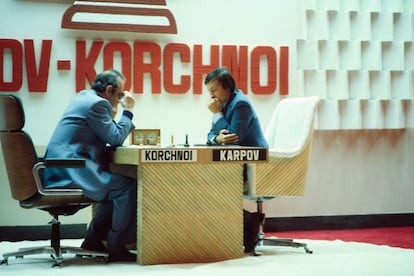Parapsychologists, sects and secret services: Remembering the most tense chess game in history
Just screened at the BCN Film Fest, ‘The World Champion’ reconstructs the surreal agony of the 1978 World Chess Championship


The British chess grandmaster Michael Stean, who was there, described the 1978 World Chess Championship (held in Baguio, The Philippines, between July and October) as “a surreal experience and the most bewildering and dirty world championship match in the history of chess.”
In their film The World Champion, director Aleksey Sidorov and producer Nikita Mikhalkov have reproduced the legendary game in which 27-year-old Anatoli Karpov, a young Soviet champion, faced off against Viktor Korchnoi, 20 years older and a Russian exile.
A game of science with a dose of art, chess was a geopolitical weapon of the first order in the last years of the Cold War. At the end of the 1970s, the Soviet Union had winning basketball and ice hockey teams, virtuoso soccer players like Oleg Blokhin and exceptional athletes like Viktor Sarteieve. It also had chess.
Karpov had regained the world champion title three years before the match in the Philippines, thanks to American Bobby Fischer forfeiting the title due to a dispute over the match format. Fischer’s win in Reykjavik in 1972 was a serious affront to the Soviets, who had had a countryman hold the title since the end of the Second World War.
With Soviet hegemony restored and Karpov, a young chess player, still on the rise, the Kremlin did not expect to face a threat like the one posed by the defection of Viktor Korchnoi in 1976.
Korchnoi had taken advantage of his participation in the Amsterdam tournament to apply for political asylum in the Netherlands. More than ideological dissidence, he was motivated by professional ambition.
Korchnoi had been the last rival defeated by Anatoli Karpov in his race to the title in 1975. At his age (he was already 45 years old when he defected), being world champion again seemed like a pipe dream. The Soviet authorities came to suggest that the time had come to step aside so as not to hinder the generational change that Karpov represented.
Korchoi had also not ingratiated himself with the regime particularly well - temperamental and impulsive, he lacked the docility and political correctness required for survival at the upper echelons of Soviet society.
From his exile, first in the Netherlands and then in Switzerland, Korchnoi continued to compete at the highest level. Prior to the 1978 world championship he defeated two former world champions (Tigran Petrosian and Boris Spassky) and a third player from the Soviet elite, Lev Polugaievsky at the Candidates Tournament.
But the truth is most pundits considered Karpov the clear favorite, even though they recognized that Korchnoi was in excellent form, his flight to the West having had a revitalizing effect on his game. In the duel between the two, bets were tilted towards the first. Michael Stean, who was part of Korchnoi’s team of analysts, said “we dreamed of beating Karpov, but it seemed unlikely to us.”
To win the title you had to win six games, not counting draws. After 17 games, Kárpov had already obtained four victories, to Korchnoi’s one.
What happened next was watched with growing astonishment by the international press.
The World Champion portrays a desperate Korchnoi wanting to resort to foul play to destabilize a superior rival. The reality is likely more nuanced than that.
The swivel chair, the sect and the snake
It started, one could say, with the sunglasses. Karpov alleged that Korchnoi used them to blind him, deliberately catching the reflection of the spotlights in the room with the sunglasses, to project against his eyes. Korchnoi retorted that he wore the shades to protect himself from the icy look of defiance with which Karpov tried to intimidate his opponents.
Head referee Lothar Schmidt and his team tested the glasses, sitting in the same position as the players, to determine to what extent the blinding mirror effect denounced by Karpov was true. They concluded that the sunglasses were not interfering but even so, they asked Karchoi to remove them as an act of goodwill, which he did in the final stretch of the match.
Which flag Korchnoi would play under - that of the Netherlands (the country that had granted him asylum) or of Switzerland (his place of residence) was also a subject of controversy. The Soviet delegation insisted he was a deserter and a stateless person who should display a white flag on his part of the gaming table. Korchnoi’s representatives countered by offering, somewhat playfully, that the exile play under the Jolly Roger, the pirate flag. In the end, it was decided that no flags would be displayed on the table.
It was the second game that brought the most surreal moments. The players began a Byzantine dispute over the types of chairs they would sit in while playing - Korchnoi insisting on a certain model for reasons of comfort, Karpov demanding that it be disassembled and X-rayed to ensure it did not include any listening devices; Karpov spinning in his chair while his opponent was thinking, which Korchnoi said was extremely disruptive.
Korchnoi also protested the blueberry yogurt that waiters served Kárpov during the second and third games, claiming it could be used for coded communications from his analysts. The referees decided that the Soviet player could continue to be served the yogurt, on the condition that it be always at the same time and that the referee be informed, prior to the yogurt being served, of what color it was.
A further issue was the presence of Vladimir Zhukar as part of the Russian delegation. Zhukar was a neurologist at the Moscow Psychology Laboratory. Korchnoi insisted that he was a parapsychologist - a kind of sorcerer who hypnotizes people to control their actions. Zhukar was forbidden from sitting in the front five rows and Korchnoi’s team would have people sit next to the neurologist and stare at him in order to break his concentration.
Then came the complete breakdown of courtesy between rivals, the most elementary protocol of chess. Kárpov stopped shaking hands with Korchnoi, while, according to the Soviets, Korchnoi started muttering insults under his breath. Any verbal interaction between the players had to be prohibited and even draw offers began to be made through the referees.
The atmosphere only grew more delirious. Korchnoi’s partner, Petra, began to attend proceedings with two members of Ananda Marga, a sect of Indian origin that was then popular within the American counterculture. Korchnoi explained that they were his yoga instructors, but they were denied access to the room when it was discovered that they both held criminal records and were using the opportunity of international exposure to demand the freedom of their group’s leader, who had been imprisoned for attempted murder. The Soviets took advantage of this blow to Korchnoi by having Dr. Zhukar returned to the front rows, where he sat close to the then-Philippine president, the dictator Ferdinand Marcos, and First Lady Imelda Marcos.
The World Champion also references unverified incidents used by Kárpov’s team to claim there was a CIA operation underway to favor Korchnoi, evidenced by the appearance of a snake in the hotel room where Kárpov was staying and that, when he moved to a private residence, noises of helicopters flying overhead or sprinklers starting up in the middle of the night prevented him from sleeping. Stean recalls that “every day there was a new press conference with mutual accusations and the referee team was forced to intervene to put out fires.”
The film also shows Korchnoi showing up at the gaming floor with a Geiger counter to monitor radioactivity levels, saying, “Believe it, the Soviets are capable of that and more.”
Amidst the geopolitical circus that now defines this match, we will never know for sure if there was really any foul play at work. The final chapter began at the end of September, with both rivals tense and not playing at their best. Karpov was leading the scoreboard by a comfortable 5-2 when his game entered a deep slump, leading to three losses in four games. It appeared the crown could return to the West.
The decisive game was played on October 17. With the confidence of his recent victories, Korchnoi adopted a high-risk defense aimed at deciding the match, but Karpov rallied, achieving a winning position in 41 moves and five hours of play.
“Karpov was the epitome of everything Viktor Korchnoi hated about the Soviet Union,” said Stean, recalling the unusual level of acrimony and personal and ideological hostility expressed during the match. “To him, Karpov had voluntarily chosen to represent the regime.”
“Viktor was a fighter. I imagine facing Karpov felt like a member of the French resistance would have felt facing someone who had collaborated with the Nazis.”
For the Soviets, said Stean, “retaining the title was like winning a version of the space race,” with Karpov as their man on the moon.
Karpov beat Korchnoi a second time three years later before being beaten himself by Garry Kasparov in 1985, still keeping the crown in Russian hands.
Tu suscripción se está usando en otro dispositivo
¿Quieres añadir otro usuario a tu suscripción?
Si continúas leyendo en este dispositivo, no se podrá leer en el otro.
FlechaTu suscripción se está usando en otro dispositivo y solo puedes acceder a EL PAÍS desde un dispositivo a la vez.
Si quieres compartir tu cuenta, cambia tu suscripción a la modalidad Premium, así podrás añadir otro usuario. Cada uno accederá con su propia cuenta de email, lo que os permitirá personalizar vuestra experiencia en EL PAÍS.
¿Tienes una suscripción de empresa? Accede aquí para contratar más cuentas.
En el caso de no saber quién está usando tu cuenta, te recomendamos cambiar tu contraseña aquí.
Si decides continuar compartiendo tu cuenta, este mensaje se mostrará en tu dispositivo y en el de la otra persona que está usando tu cuenta de forma indefinida, afectando a tu experiencia de lectura. Puedes consultar aquí los términos y condiciones de la suscripción digital.








































